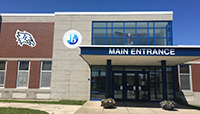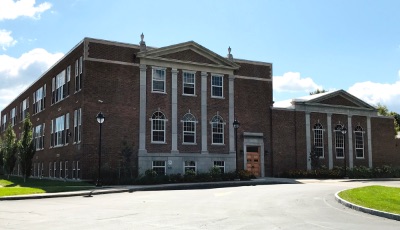7521 - Concussion Management
| Policy: Concussion Management | Policy Number: 7521 |
| Date of Original Policy: 08/15/2012 | Date Revision Adopted: 10/14/2020 |
| Reviewed by Policy Committee: 09/16/2020 | Date of Next Review: 09/28/2023 |
| Replacement of Policy Number: |
Jordan-Elbridge Board of Education recognizes that concussions and head injuries are the most commonly reported injuries in children and adolescents who participate in sports and recreational activities. The physical and mental well being of our students is a primary concern, therefore, the Jordan-Elbridge Board of Education adopts the following policy to support the proper evaluation and management of concussions and/or other head injuries.
A concussion is a mild traumatic brain injury (MTBI). A concussion occurs when normal brain functioning is disrupted by a blow or jolt to the head or body that causes the head and brain to move rapidly back and forth. Recovery from concussion and its symptoms will vary. Avoiding re-injury and over-exertion until fully recovered are the cornerstones of proper concussion management. Concussions can impact a student’s academics as well as their athletic pursuits.
Symptoms:
• Headache
• Nausea or vomiting
• Unusual drowsiness or difficult to arouse
• Changes in the level of consciousness; alertness and/or personality
• Blood or other fluids draining from the ears or nose
• Convulsions or seizures
• Dizziness, trouble with coordination or balance
• Disturbances in vision
• He/She appears confused or unable to concentrate
• Pupils become dilated or unequal in size/shape
• Weakness or numbness of arms, legs, or trouble walking
• Fever and stiff neck
• Nausea or vomiting
• Unusual drowsiness or difficult to arouse
• Changes in the level of consciousness; alertness and/or personality
• Blood or other fluids draining from the ears or nose
• Convulsions or seizures
• Dizziness, trouble with coordination or balance
• Disturbances in vision
• He/She appears confused or unable to concentrate
• Pupils become dilated or unequal in size/shape
• Weakness or numbness of arms, legs, or trouble walking
• Fever and stiff neck
Concussion Management Team (CMT)
In accordance with the Concussion Management and Awareness Act, the Jordan-Elbridge Central School District is authorized, at its discretion to establish a concussion Management Team (CMT) to be composed of, but not limited to the following: Athletic Director, School Nurse, School District Physician, Coach, Athletic Trainer or such other appropriate personnel as Designated by the Superintendent and/or his designee. The Concussion management Team will oversee and implement the School District’s concussion policy and regulations including the requirement that all school coaches, physical education teachers, nurses and certified athletic trainers who work with and/or provide instruction or pupils engaged in school sponsored athletic activities and/or clubs complete training relating to mild traumatic brain injuries. Furthermore, the concussion management team may establish and implement a program which provides information on mild traumatic brain injuries to parents and/or guardians throughout each school year.
Staff Training/Course of Instruction
Each school coach, physical education teacher, school nurse and certified athletic trainer who works with and/or provides instruction to students in school-sponsored athletic activities/clubs (including physical education class and recess) shall complete a course of instruction every two (2) years relating to recognizing the symptoms of concussions or MTBIs and monitoring and seeking proper medical treatment for students who suffer from a concussion or MTBI.
Components of the training will include:
a) Definition of mild traumatic brain injury (MTBI);
b) Signs and symptoms of MTBI;
c) How MTBIs may occur;
d) Practices regarding prevention; and
e) Guidelines for the return to school and/or school activities for a student who has suffered an MTBI, even if the injury occurred outside of school.
b) Signs and symptoms of MTBI;
c) How MTBIs may occur;
d) Practices regarding prevention; and
e) Guidelines for the return to school and/or school activities for a student who has suffered an MTBI, even if the injury occurred outside of school.
The course can be completed by means of instruction approved by SED which include, but are not limited to, courses provided online and/or by teleconference.
Information to Parents
The District shall include the following information on concussion in any permission/consent form or similar document that may be required from a parent/guardian for a student’s participation in the sport, club or school sponsored activity.
a) Definition of mild traumatic brain injury (MTBI);
b) Signs and symptoms of MTBI;
c) How MTBIs may occur;
d) Practices regarding prevention; and
e) Guidelines for the return to school and/or school activities for a student who has suffered an MTBI, even if the injury occurred outside of school
b) Signs and symptoms of MTBI;
c) How MTBIs may occur;
d) Practices regarding prevention; and
e) Guidelines for the return to school and/or school activities for a student who has suffered an MTBI, even if the injury occurred outside of school
The District will provide a link on its website, if one exists, to the above list of information on the State Education Department’s and Department of Health’s website.
Identification of Concussion and Removal from Athletic Activities
The District shall require the immediate removal from all athletic activities of any student who has sustained, or is believed to have sustained, a mild traumatic brain injury (MTBI) or concussion. Any student demonstrating signs, symptoms or behaviors consistent with a concussion while participating in a class, extracurricular activity, or interscholastic athletic activity shall be removed from the class, game and/or activity and must be evaluated as soon as possible by the appropriate health care professional. Such removal must occur based on display of symptoms regardless of whether such injury occurred inside or outside of school. If there is any doubt as to whether the student has sustained a concussion, it shall be presumed that the student has been injured until proven otherwise. The District shall notify the student’s parents or guardians and recommend appropriate evaluation and monitoring.
The School District may choose to allow credentialed District staff to use validated Neurocognitive computerized testing as a concussion assessment tool to obtain baseline and post-concussion performance data. These tools are not a replacement for medical evaluation to diagnose and treat a concussion.
Return to School Activities and Athletics
The student shall not return to physical activity (including athletics, physical education class and recess) until he/she has been symptom free for not less than forty eight (48) hours, and has been evaluated and received written authorization from a licensed physician. In accordance with Commissioner’s Regulations, the School District’s Medical Director will give final clearance on a return to activity for extra-class athletics. All such authorizations shall be kept on file in the student’s permanent health record. The standards for return to athletic activity will also apply to injuries that occur outside of school. School staff should be aware that students may exhibit concussion symptoms caused by injuries from outside activities and that these visible systems also indicate a removal from play.
The District shall follow any directives issued by the student’s treating physician with regard to limitations and restrictions on school and athletic activities for the student. The District’s Medical Director may also formulate a standard protocol for treatment of students with concussions during the school day.
In accordance with NYSED guidelines, this policy shall be reviewed yearly and updated as necessary in accordance with the New York State Education Department guidelines. The Superintendent, in consultation with the District’s Medical Director and other appropriate staff, may develop regulations and protocols for strategies to prevent concussions, the identification of concussions, and procedures for removal from and return to activities or academics.
ImPACT Testing
The District offers to conduct Immediate Post Concussion Assessment and Cognitive Testing (ImPACT) prior to the start of a season to establish baseline data for a student. This data is valid for two years. Notes: ImPACT is the most widely used and scientifically validated computerized concussion evaluation system currently available. Athletes in collision and contact sports which include football, lacrosse, basketball and wrestling, are to take a “new” baseline test every two years: grade 7, grade 9, and grade 11.
Management of Concussion in Sports- Based on Zurich Guidelines 2008
The Zurich Guidelines were established by an international panel of experts on sports concussion. These guidelines are based on the most recent research, and are accepted as part of the Board of Education Administrative procedure in dealing with BOE policy for head injury management.
Concussion is now classified as either simple or complex.
Simple Concussions are those where loss of consciousness (if any) was less than one (1) minute, and symptoms resolve without complications within seven to ten (7-10) days. In such cases, apart from limiting playing and other activities while symptomatic, no further intervention is required during the period of recovery.
Complex Concussions include those where there is prolonged loss of consciousness, symptoms or cognitive impairment lasting longer than seven (7) days, or there is a history of more than one (1) concussion. In these cases, return to play should be managed by a multidisciplinary team, and formal neuropsychological testing (testing of attention, memory, etc.) should be considered at a specialized head injury clinic.
Zurich Guidelines for Return to Play (Participation) After Sports Concussion Administrative Procedure
When a player shows ANY signs or symptoms of a concussion:
1. The Player should NOT be allowed to return to play in the current game or practice
2. The player should not be left alone, and regular monitoring for deterioration is essential over the initial few hours following the injury.
3. The player should be medically evaluated following the injury.
4. Return to participation must follow a medical clearance and successful completion of “return to play (participation) protocol”.
2. The player should not be left alone, and regular monitoring for deterioration is essential over the initial few hours following the injury.
3. The player should be medically evaluated following the injury.
4. Return to participation must follow a medical clearance and successful completion of “return to play (participation) protocol”.
The cornerstone of proper concussion management is rest until all symptoms resolve and then a graded program of exertion before return to sport, involving the following six (6) Zurich Guidelines:
1. No Activity, complete rest. When symptom free, proceed to level 2.
2. Light aerobic exercise such as walking or stationary cycling, no resistance training.
3. Sport specific exercises- for example skating in hockey, running in soccer, progressive addition of resistance training at steps 3 or 4.
4. Non contact training drills.
5. Full contact training after medical clearance.
6. Game play.
If any post concussion symptoms recur, the athlete should drop back to the previous level and try to progress again after twenty-four (24) hours. The student athlete should also be monitored for recurrence of symptoms due to mental exertion, such as reading, working on a computer or other technological device, or taking a test. In cases of complex concussion, the rehabilitation will be more prolonged and return to play advice should be provided by professional with specific expertise in the management of such injuries. Students who received multiple concussions must be released by the school physician.
Education Law Sections 207; 305 (42), and 28545
8 NYCRR 135.4 and 136.5
Guidelines for Concussion Management in the School Setting, SED Guidance Document, June 2012




